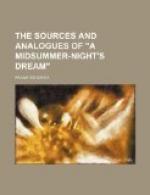Now a herald proclaimed from a scaffold the will of Duke Theseus, decreeing the weapons with which the tourney should be fought, and the rules of the combat. Then with trumpets and music, Theseus and Hippolyta and Emilia in a noble procession took their places; and from the west gate under the temple of Mars came Arcite with a red banner, and from the east, under the temple of Venus, Palamon with a white banner. And the names of the two companies were recited, the heralds left pricking up and down, the trumpet and clarion sounded, and the just began. Sore was the fight, and many were wounded and by the duke’s proclamation removed from the fight; and many a time fought Palamon and Arcite together. But everything must have an end; Emetreus gave Palamon a wound; and though Ligurge attempted his rescue, he was borne down; and though Emetreus was thrust from his saddle by Palamon, Palamon was wounded, and had to give up the combat and the hope of winning Emilia. And Theseus cried to them that the tourney was finished, and that Arcite should have the lady; whereat the rejoicing of the people was loud.
But in heaven Venus wept, so that her tears fell down into the lists; yet Saturn promised that her sorrow should be eased soon.
And in truth as Arcite rode in triumph down the lists, looking up at Emilia, Pluto, at the bidding of Saturn, sent from hell a fury, that started from the ground in front of Arcite’s horse, which shied and threw his rider; and Arcite pitched on his head, and lay as though dead. They bore him to Theseus’ palace, cut his harness from off him, and laid him in a bed.
Theseus for three days entertained the knights of the tourney, and then all of them went their several ways. But Arcite lay dying; no longer had Nature any power;
“And certeinly, ther nature wol
nat wirche,
Far-wel, phisyk! go ber the man to chirche!”
On his deathbed he called Palamon and Emilia to his side, and bade farewell to his heart’s queen, commending Palamon to her,
“As in this world right now ne knowe
I non
So worthy to ben loved as Palamon
That serveth yow, and wol don al his lyf.
And if that ever ye shul ben a wyf,
Forget nat Palamon, the gentil man.”
And his speech failed him, and his strength went out of him: but he still kept his eyes fixed on his lady, and his last word was “Mercy, Emilye!”
Theseus gave Arcite a costly funeral, and built his funeral pyre in the grove where Palamon had heard him lament on the morning of May. And when by process of time the grief and mourning for Arcite had ceased, Theseus sent for Palamon and Emilia; and with wise words bidding them be merry after woe, gave Emilia to Palamon, who wedded her, and they lived in bliss and in richness and in health.
“Thus endeth Palamon and Emelye.
And God save all this faire companye!”
Such is Chaucer’s tale of Palamon and Arcite. It was dramatised before Shakespeare’s day by Richard Edwardes in a play now lost. Possibly the play of “Palamon and Arcite” four times recorded—in for different spellings—by Henslowe in his Diary[14] is Edwardes’ play, but as the latter was performed at Oxford before Queen Elizabeth as early as 1566, it is at least equally possible that Henslowe’s play is another version.




